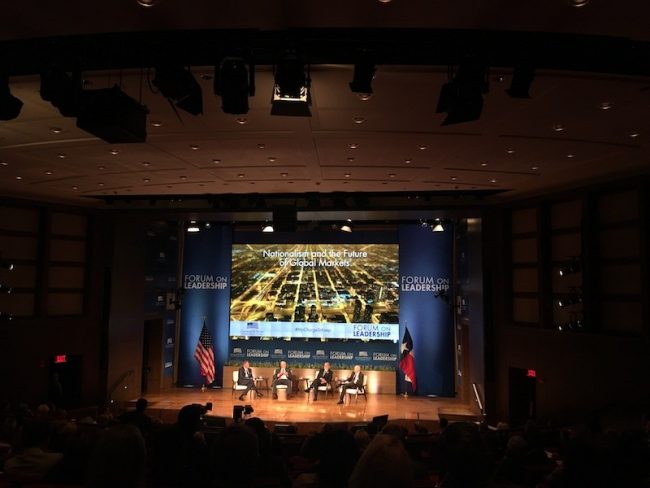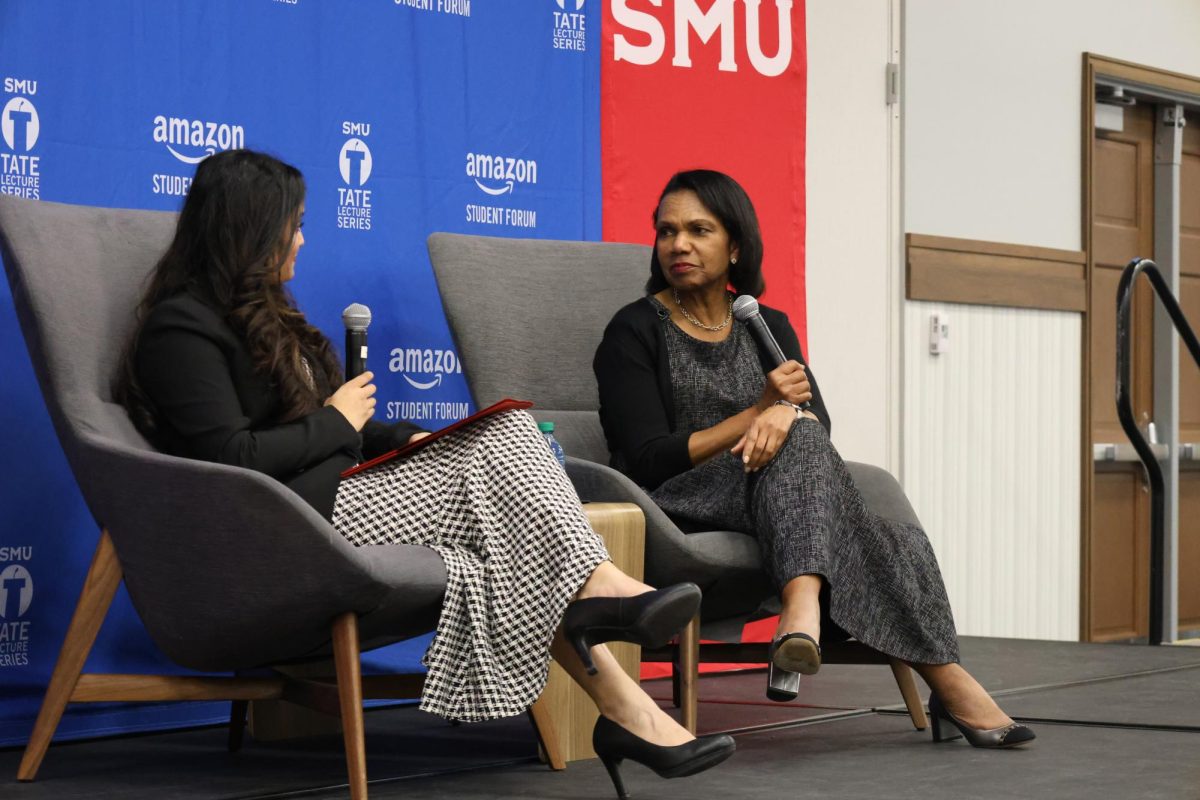Three economists and political figures convened to discuss nationalism and global markets as part of the Bush Institute’s Forum on Leadership Wednesday, April 18.
The panel included Henry Paulson, Secretary of the Treasury under George W. Bush and former chairman and CEO of Goldman Sachs; Ben Bernanke, former chairman of the Federal Reserve; and Edward Lazear, professor of economics at Stanford University.
“I don’t think our democracy is going to work,” Paulson said. “I don’t think our political system is going to work unless we figure out how to have growth be more inclusive.”
This lack of inclusivity is what is driving our current political climate, Paulson said.
“We have big groups of people that feel disaffected by the pace of change, they get left behind. This is where populism comes from,” Paulson said. “The challenge really is a political challenge.”
“The sorts of things that I worry about… not just rising protectionism, but higher levels of government debt around the world,” Paulson said.
The other panelists echoed his concern.
“[Attempting to change] integration of the global economy, the expansion of trade, the expansion of human movement, immigration…That can slow growth, it can disrupt the markets. We’ve seen how the markets have responded to discussions of trade wars, for example,” Bernanke said.
“There is no doubt that if I were to focus on the big policy issue that’s going to face us over the next 20 years, it definitely has to be the debt,” Lazear said.
“In order to close that gap [of the deficit] we would have to increase taxes across the board, not just taxes on the rich, by about 50 percent. If we were to increase taxes by 50 percent, that would have absolutely devastating effects on economic growth and on activity,” Lazear said.
Bernanke also expressed concerns about the debt.
“I think there is a bit of concern there because the debt and deficit are high. The flexibility of fiscal policy to respond to a downturn is less than it would otherwise be. That puts a lot of burden on the Fed to respond,” Bernanke said.
“It’s not clear that, if we had a deep recession, that monetary and fiscal policy would be as effective in responding as might have been the case to the past,” Bernanke said.
Another important topic discussed was trade relationships, specifically with China.
“When we look at this century, I believe more than anything else, how the U.S. figures out how to deal with a rising China… more than anything else, that shapes the geopolitical landscape that we have in the 21st century,” Paulson said.
“The most important thing that we need to do is to not be afraid of competition, to recognize that, despite the competition, China and the U.S. have many shared interests,” Paulson said. “We’re not going to solve the major global problems we have… unless we find common ground with China.”
Paulson also advocated for rejoining the Trans-Pacific Partnership to create a positive agenda in Asia.
“The onus is on us… to fix our economic problems at home, to be strong economically, militarily, and diplomatically, because I think the Chinese, like any other people, respect strength,” Paulson said.
“We certainly don’t need to view them as an enemy because we can’t afford another Cold War,” Paulson said.
Lazear mentioned a more positive point.
“The United States has outgrown our G7 neighbors from some period of time, and we’ve done so primarily for three reasons,” Lazear said. “The first is that we work hard. Secondly, we actually have low taxes, despite the fact that we all think our taxes are too high. They are really quite low relative to the rest of developed economies. Third… is that we do a really good job of integrating our immigrants.”
“While that sounds kind of backwards given the current rhetoric, one of the ways to see that is if you look at the unemployment rates of immigrants versus the unemployment rates of the native-born population in every G7 country, except for the United States, the unemployment rates are higher for immigrants than it is for the native-born population,” Lazear said.
“Obviously, that’s not the only measure of immigration, but it does give you an indication that our immigrants are here to work, and they’re actually successful at getting jobs,” Lazear said.
The panelists were optimistic about one part of the future: youth and the next generation.
“If we’re optimistic, it’s really got to come from the young people,” Bernanke said.
“But if I had a caution… I think I see so much political correctness, so much talking about safe-spaces, worried about hurting someone’s feelings, and I also see a lack of patriotism,” Bernanke said. “Really, if we’re going to meet the challenges we need to make, it’s going to take a greater sense of patriotism from young people.”















